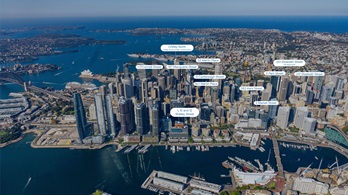Looking at investing in property? The Direct approach might be best.
By proceeding you confirm that you are a resident of Australia or New Zealand accessing this website from within Australia or New Zealand and you represent, warrant and agree that:
- you are not in the United States or a “U.S. person”, as defined in Regulation S under the U.S. Securities Act of 1933, as amended (“U.S. Person”), nor are you acting for the account or benefit of a U.S. Person;
- you will not make a copy of the documents on this website available to, or distribute a copy of such documents to, or for the account or benefit of, any U.S. Person or any person in any other place in which, or to any other person to whom, it would be unlawful to do so; and
- the state, territory or province and postcode provided by you below for your primary residence in Australia or New Zealand are true and accurate.
Unfortunately, legal restrictions prevent us from allowing you access to this website. If you have any questions, please contact us by e-mail by clicking on the link below.
No-one can be certain about the full impacts of COVID-19 on the economy, on investments and on people’s lives. The extent depends on the pace and strength of recovery and the return of consumer and investor confidence.
Like many nations across the world, Australia has looked to protect our health and economy through intervention, including extraordinary support from the Federal Government, State Governments, Reserve Bank of Australia and regulatory bodies.
The pandemic has impacted the commercial property sector in different and varied ways, including large numbers of office workers currently working from home, retail tenancies having to temporarily close, and an increase in demand for industrial space from retailers and logistics companies struggling to keep pace with the increase in online shopping.
In an environment of economic uncertainty, where most economic commentators expect interest rates to stay low for the foreseeable future, investors will be increasingly looking for secure and stable income yields.
Commercial property, particularly office and industrial & logistics properties, with long-term leases to strong tenant covenants, offer good opportunities to those wanting regular and reliable income. The widening of the spread between the bond and property yields will provide tailwind support to commercial property going forward. Income returns from quality unlisted property funds owning commercial property typically range from between 5.5% and 6.5% p.a. after all costs and expenses.
Look for office property with strong tenant profiles
In the office market, the assets that will attract strong investor demand will be those with tenants such as Federal and State Government bodies or other blue-chip firms where there is greater level of income durability. Long-leased, high-quality assets in core locations, with strong tenant profiles are likely to become more desirable as investors look for assets with lease profiles that extend beyond this period of uncertainty. For example, a fund with a weighted average lease expiry (WALE) of 8-10 years, and a high occupancy level, will be better equipped to weather the current short term volatility in the tenancy market, because the fund’s cashflow is more secure, underpinning its ability to pay distributions to investors.
As social distancing restrictions ease, and people return to work, companies will need to balance space efficiency with employee health and safety. Tenants will also have a greater sensitivity towards hygiene within the workplace. Landlords such as Charter Hall that have high-quality office assets which provide quality air, ventilation systems and other indoor environmental features, and are managed by experienced property and asset management teams, are well placed to deliver a healthier and safer workplace environment that tenants and their employees will now expect.
E-commerce growth fuels industrial & logistics
In the industrial & logistics sector, demand has increased significantly in recent times as a result of the growth in online retailing. COVID-19 related impacts are likely to accelerate these long-term structural tailwinds. There are groups of consumers who are now using online shopping for the first time. Many of them will continue to shop this way even after the crisis has passed.
Across the Charter Hall portfolio, we have seen many examples of industrial and logistics tenants experiencing very high levels of activity due to increased online shopping, and major retailers and logistics companies reassessing their supply chain networks.
For example, food logistics properties leased to Coles and Woolworths have been busy keeping up with demand to ensure food and staples are back on the shelves in the shortest possible time. We have a distribution centre in Melbourne where the tenant has increased the hours of operation to satisfy the demand from consumers shifting their purchases of exercise and sporting equipment to online channels. The major parcel delivery groups like Toll, DHL, Australia Post and other third party logistics operators have also experienced buoyant trading conditions with a material uplift in parcel deliveries, all of which need to pass through a distribution centre.
As industrial users reassess their inventory volumes and continuity plans to mitigate future supply chain disruption risks, there will likely be greater demand for larger national/regional import centres, last-mile logistics and cold storage assets. While a surge in demand for some goods (i.e. toilet paper and pasta) has tested supply chains in the short term, we believe this will be a temporary impact, and over the medium and longer term the industrial & logistics sector will continue to outperform.
The benefits of investing in commercial property directly
The challenge for many investors is knowing how to access these opportunities. Should they buy shares in listed real estate trusts (REITs), invest in single asset property syndicates or unlisted direct property funds that own a portfolio of assets? As always, it comes down to each investor’s objectives, appetite for risk, liquidity requirements and their investment window, which is why we always recommend consulting your financial adviser first.
Charter Hall Direct is Australia’s leading direct property fund manager¹ and is part of the wider Charter Hall Group which manages $40 billion of Australian institutional quality property assets.
If unlisted commercial property is of interest to you, it’s important to understand that direct property fund investments are ‘set plays’. Unlike listed property trusts, which trade on the ASX and can be bought or sold each day, direct property funds are unlisted and typically have a fixed investment or liquidity term. That usually means investors commit for periods of around five years – depending on the underlying fund – at which time there is a liquidity review giving the option for an investor to exit the fund or elect to stay in for another five years. So, they will suit investors looking to balance their portfolio with a medium-term investment that has historically delivered consistent and growing income returns over the cycle.
If stability is important to you, our research shows that unlisted direct property funds have exhibited lower relative volatility than other major asset classes over the last 20 years.
7 questions to ask yourself
Here are some important factors to consider when weighing up whether an Australian unlisted direct property fund is right for you:
1. Are you dealing with an experienced Manager that you can trust? Check their track record, funds under management, awards, resourcing levels and location of personnel.
2. Are the properties in the portfolio modern, well-located assets?
3. What is the weighted average lease expiry or WALE? In other words, how long have tenants signed up for? Longer-term leases mean the income is secured for a greater time period, providing more income security to investors.
4. What is the vacancy rate? A high vacancy rate increases the risk profile of the investment.
5. Who are the tenants? Are they performing well financially, do they have a robust balance sheet and strong cashflows?
6. What is the gearing level? A higher gearing ratio indicate that a fund has a higher degree of financial leverage and is more susceptible to downturns in the economy and the property cycle. Most of our investments are around the 25-35% gearing level which we believe is a prudent level.
7. What is the expected length of the investment? It’s important that it suits your requirements.
Charter Hall offers direct access to both the office and industrial & logistics property sectors through our unlisted property funds. To find out more about these funds, call us on 1300 652 790, email us or speak with your financial adviser.
1. Based on Funds Under Management (FUM) from the Core Property – Australian Unlisted Property Funds Report in January 2020. This does not constitute an offer for the issue, sale or purchase of any securities or any recommendation in relation to investing in any asset. This information has been prepared without taking account of any particular investor’s objectives financial situation or needs. Charter Hall Direct Property Management Limited (ACN:073 623 784 AFSL:226849) (“CHDPML”) does not make any representation or warranty as to the accuracy or completeness of any statement above, including any forward-looking statement. Past performance is not a reliable indicator of future performance. All figures stated herein are as at 31 March 2020 and in Australian dollars unless otherwise stated. © Charter Hall Group.


